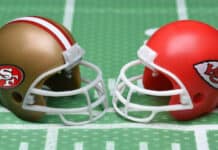It’s that time of year again and football fans across the country are gearing up for their favorite day. In a little less than two weeks, the Los Angeles Rams and New England Patriots will face off in Super Bowl LIII at Mercedes-Benz Stadium in Atlanta. It will be the first Super Bowl hosted at the Falcon’s stadium, which opened in 2017.

Even for those not lucky enough to have tickets to the big game, a lot of thought has to go into preparing for their Super Bowl festivities: What snacks to serve? Stay home, watch at a friend’s house, or head to a bar? Go to work the next day or stay home?
According to new research from OfficeTeam, for many employees, the answer to that last question is “stay home.” And managers aren’t too happy about that.
Employee absenteeism after major sports events like the Super Bowl is on the rise, according to the survey. More than half of professionals (54 percent) know someone who’s called in sick or made an excuse for skipping work following a big game. That’s up from 41 percent three years ago.
In another survey, senior managers identified playing hooky the day after (42 percent) as the most distracting or annoying employee behavior when it comes to sports, a 20-point jump from a similar survey in 2017.
 Here are some additional findings:
Here are some additional findings:
- Professionals ages 18 to 34 (65 percent) most often said they know someone who’s played hooky following a major sports event, compared to those ages 35 to 54 (52 percent) and 55 and older (36 percent). Sixty-three percent of male employees admitted the same, versus 44 percent of women.
- Among the 28 U.S. cities surveyed, the most senior managers in Cleveland (56 percent), Denver (52 percent) and Chicago (51 percent) were annoyed by staff missing work the day after a big game.
“It’s easy to get drawn into the excitement of major sports events,” said Stephanie Naznitsky, executive director of OfficeTeam. “Employees can do their part to keep it business as usual by giving advance notice if they want to take a day off, keeping game discussions to a minimum, and following company guidelines for things like breaks and fan gear.”
Naznitsky added, “Managers may cut their workers some slack leading up to and after a popular event by offering schedule flexibility or organizing group activities to celebrate. It’s also a good idea to contact a staffing firm to help cover employee absences.”





















![[VIDEO] Collect Asset Data at the Speed of Walking a Building](https://facilityexecutive.com/wp-content/uploads/2024/02/maxresdefault-324x160.jpg)
The last time I worked for someone else was December 1999. And never, not even once, did I ever call in sick when I was not sick. Yeah, I’m probably a freak.
(I never called in sick when I was sick either, but let’s leave that discussion for another day.)